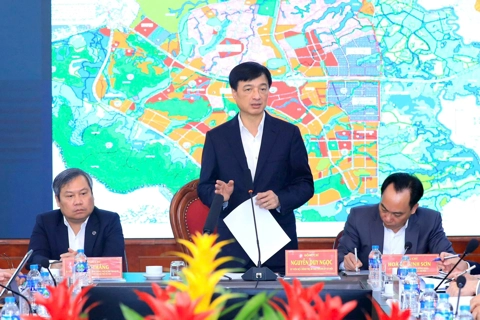Hanoi Party steers capital into a bold new era
With a proud 95-year tradition and a spirit of innovation and bold action, Hanoi’s political system continues to strengthen, driving the capital’s socio-economic development forward.
The Hanoi Times — Hanoi now boasts significant opportunities in terms of land and human resources, along with diverse advancements in infrastructure and economic development.
This statement was made by Nguyen Van Phong, Deputy Secretary of the Hanoi Party Committee, at the conference "95th Anniversary of the Founding of the Hanoi Party Committee: Stature, Historical Significance (March 17, 1930 - 2025)" organized by the municipal Party Committee early this week.
Phong said the city also remains resolute in its commitment to national defense and security while preserving its rich cultural heritage and identity.
Steadily renewing thought and action
Phong said Hanoi has undergone a major transformation, inheriting the heroic revolutionary tradition and experience of 95 years of development.
Hanoi's total budget revenue has been increasing every year, the economy has been expanding steadily, and the economic structure has been changing towards industrialization and modernization. In 2021, Hanoi's growth increased by 2.91% in a very challenging environment.
With a growth rate of 8.89% in 2022, Hanoi's economy rebounded strongly from the Covid-19 epidemic. In 2023 and 2024, it grew by 6.27% and 6.52%, respectively.
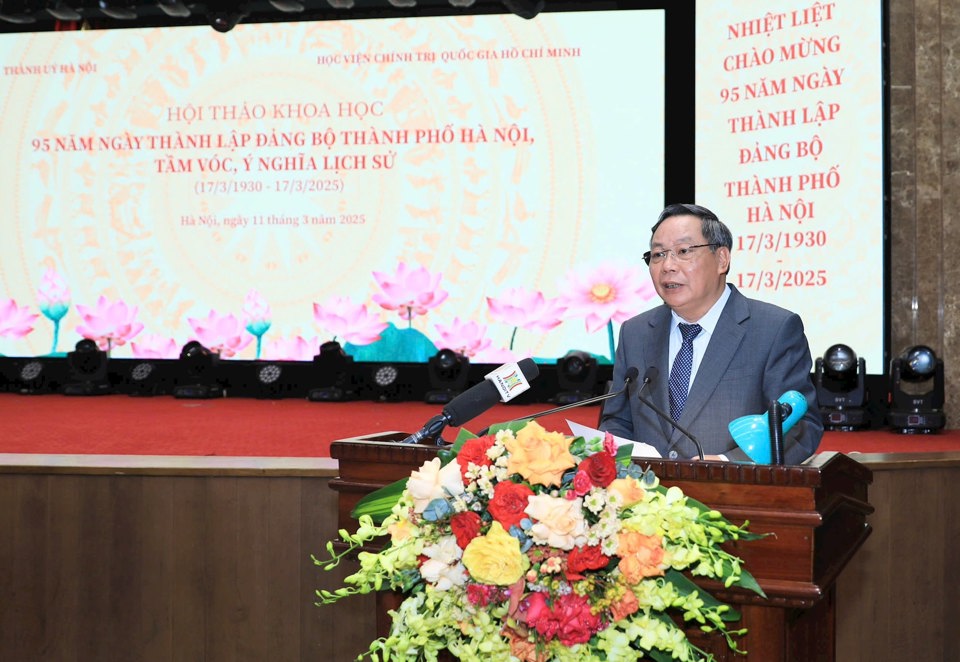
Standing Deputy Secretary of the Hanoi Party Committee Nguyen Van Phong speaks at the conference. Photo: Thanh Hai/The Hanoi Times
Despite covering just 1% of the country's land area and housing over 8% of its population, Hanoi contributes around a quarter of national budget revenue and more than 16% of GDP.
The capital's economy now totals approximately US$59 billion, representing over 10% of the nation's economic output.
Meanwhile, Le Xuan Tung, former Secretary of the Hanoi Party Committee, drew lessons from the experience of the municipal Party Committee in putting the Party's policies and decisions into practice; the role of implementing personnel work with a systematic and scientific plan for training, nurturing, and appointing cadres.
Professor Le Xuan Tung said that the selection of cadres for key positions must have a long-term vision, early recognition and training to match the requirements.
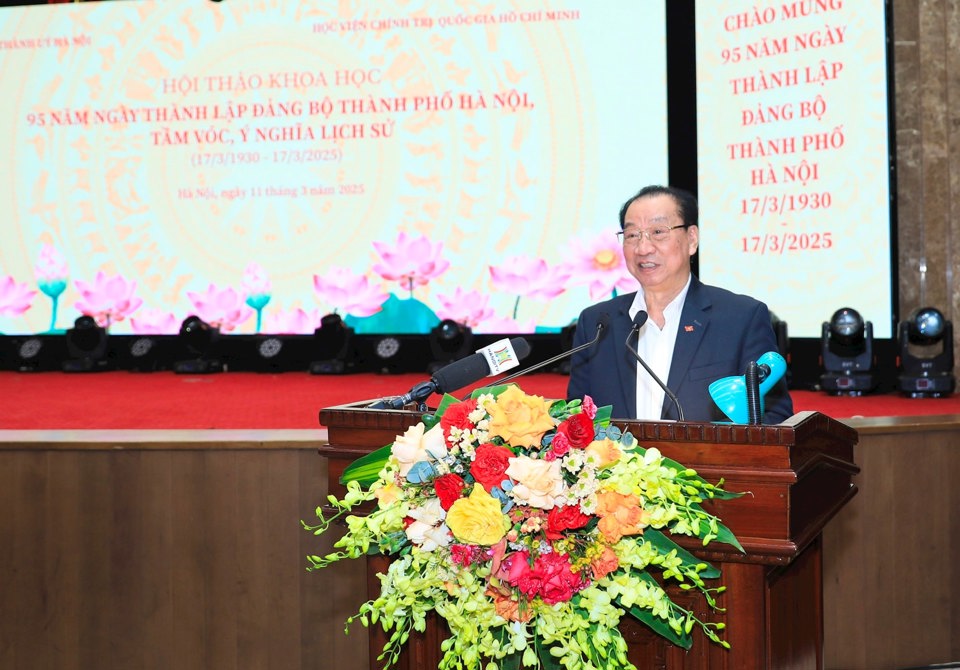
Phung Huu Phu, former Deputy Secretary of the Hanoi Party Committee, Chairman of the Hanoi People's Council. Photo: Thanh Hai/The Hanoi Times
Phung Huu Phu, former Deputy Secretary of the Hanoi Party Committee and former Chairman of the Hanoi People's Council, stated that the Hanoi Party Committee has clearly defined the capital's unique position, role, and distinct characteristics. It has also accurately identified its strengths, key challenges, and critical focus areas for effective leadership.
Furthermore, in the leadership process, the Hanoi Party Committee always focuses on promoting the advantages and unique characteristics of Hanoi to identify and effectively implement the policy of protecting and developing the capital.
According to Phu, the municipal Party Committee consistently places a high value on improving the Party and the political system to make it pure, powerful, and all-encompassing; politically stable, united in thought and action; beautiful in culture and ethics; scientific in organization; exemplary in cadres; and fulfilling its obligations before the entire Party and the nation's citizens.
Leading role in the new era
On May 5, 2022, the Politburo issued Resolution No. 15 on the direction and tasks of the capital's development to 2030, with a vision to 2045. The resolution states that by 2030, Hanoi will be a modern, cultured, and civilized city that serves as the hub for the development of the Red River Delta, the North's and the nation's main economic region.
With the vision of 2045, Hanoi will be a globally connected city with high living standards, with a GRDP per capita of over US$36,000; with comprehensive, unique, and harmonious economic, cultural and social development; setting an example for the whole country; reaching a level of development on par with the capitals of developed countries.
To achieve the goal of becoming a globally connected city, Tien pointed out five pillars of the capital's development: culture and heritage; green development, circular economy; synchronized infrastructure, civilized and modern transportation; digital society, smart city, digital economy; science, technology and innovation.
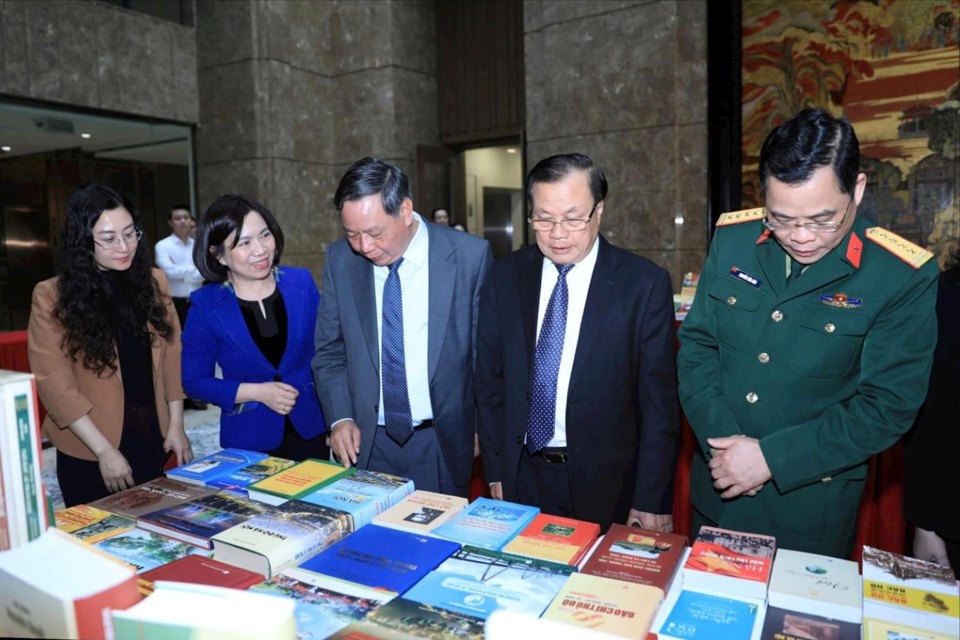
Hanoi leaders visit the Hanoi Party Committee book exhibition. Photo: Thanh Hai/The Hanoi Times
Nguyen Danh Tien, Director of the Institute of Party History at the Ho Chi Minh National Academy of Politics, emphasized Hanoi’s determination to solidify its status as Vietnam’s political-administrative center and a key hub for culture, science, education, the economy, and international exchange.
To achieve this, the Hanoi Party Committee and city government have prioritized urban planning, development projects, and administrative expansion. Notably, in May 2008, the National Assembly approved a resolution adjusting Hanoi’s administrative boundaries. The city’s area tripled to 3,345 square kilometers, encompassing 29 administrative units—including 10 urban districts—and a population exceeding six million.
Guided by the principles of socio-economic development as the center, Party building as the key, cultural advancement as the spiritual foundation, and national defense and security as constant priorities, Hanoi continues to pursue comprehensive, sustainable growth.
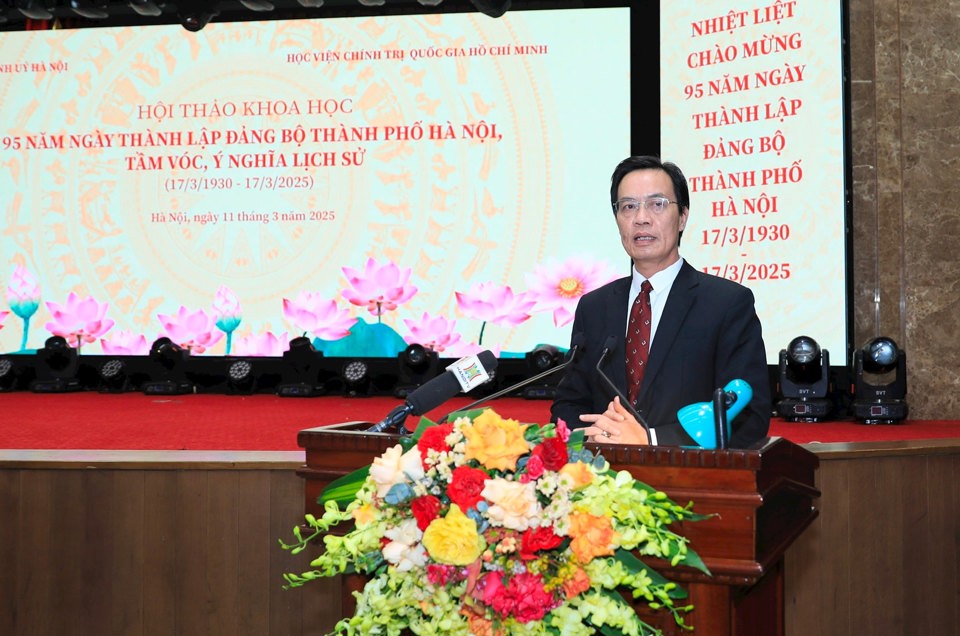
Nguyen Danh Tien, Director of the Institute of Party History, the Ho Chi Minh National Academy of Politics. Photo: Thanh Hai/The Hanoi Times
Tien also pointed out five pillars of the capital's development: culture and heritage; green development, circular economy; synchronized infrastructure, civilized and modern transportation; digital society, smart city, digital economy; science, technology and innovation.
He also identified four strategic breakthroughs: establishment of excellent governance institutions; development of an interconnected and synchronized infrastructure system, especially urban railways; development of quality human resources and utilization of human resources; and urban development, environmental and landscape improvement.









